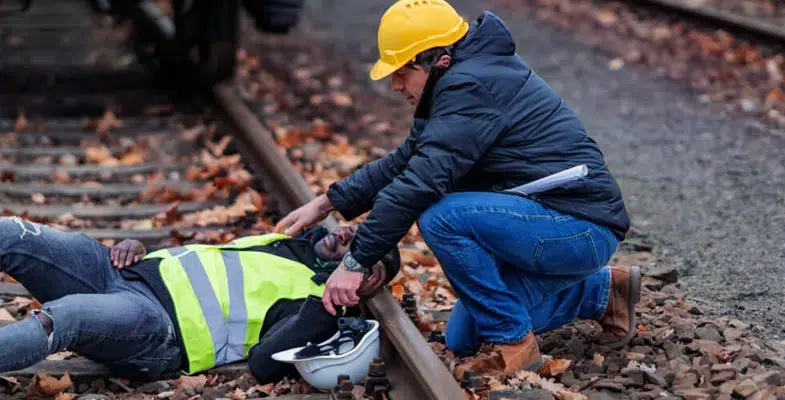
Railroad accidents can have profound consequences, impacting lives and communities in significant ways. From derailments to collisions, these incidents underscore the importance of understanding liability in the aftermath. Whether you’re a commuter, a worker in the industry, or someone affected by such an event, navigating the complexities of railroad accident liability is crucial for seeking justice and securing compensation.
When accidents occur, determining who bears responsibility involves navigating a web of legal and regulatory frameworks. Railroad companies, equipment manufacturers, and even government agencies overseeing safety standards may all play roles in accident causation and accountability. This intricate landscape requires clarity to ensure those affected receive the support they deserve.
Consulting with a knowledgeable personal injury lawyer can provide invaluable guidance in navigating these challenging circumstances, ensuring your rights are protected and the responsible parties are held accountable.
Understanding the nuances of railroad accident liability empowers individuals to pursue legal recourse effectively, advocating for safer practices and compensation that reflects the true impact of such incidents.
Common Causes of Railroad Accidents
Railroad accidents can stem from various factors, often resulting from a combination of human errors and technical failures:
- Human Error and Negligence: Mistakes by train operators, signal operators, or maintenance personnel can lead to critical errors in judgment or oversight.
- Equipment Failure and Maintenance Issues: Malfunctioning brakes, faulty tracks, or inadequate maintenance practices can compromise the safe operation of trains.
- Signal and Communication Failures: Deficiencies in communication systems or signal malfunctions can mislead train operators or fail to alert them to potential hazards.
Parties Potentially Liable in Railroad Accidents
When a railroad accident occurs, liability can extend to various parties involved in the operation and oversight of railroad systems:
- Railroad Companies and Operators: Railroad companies and operators bear primary responsibility for ensuring the safe operation of trains and maintaining infrastructure. Negligence in maintenance, training, or operational procedures can lead to accidents.
- Manufacturers of Faulty Equipment: Manufacturers of railroad equipment, such as locomotives, brakes, and tracks, may be liable if their products are defective or fail due to inadequate design or manufacturing.
- Government Agencies Responsible for Oversight: Regulatory bodies and government agencies tasked with overseeing railroad safety and compliance play a crucial role. Failure to enforce safety regulations or address safety concerns promptly can contribute to accidents and subsequent liability issues.
Legal Principles and Liability Standards
Understanding legal principles and liability standards in railroad accidents is crucial for determining responsibility and seeking compensation:
- Negligence and Its Role: Negligence involves failing to exercise reasonable care, leading to harm. In railroad accidents, negligence can arise from inadequate maintenance, improper operation, or failure to adhere to safety protocols.
- Strict Liability in Certain Circumstances: Strict liability holds parties accountable for harm regardless of fault if they engage in inherently dangerous activities. For railroads, this might apply to transporting hazardous materials or operating high-risk sections.
- Contributory Negligence and Its Impact: Contributory negligence occurs when the injured party’s actions contribute to the accident’s cause. States vary in how contributory negligence affects claims; some reduce compensation based on the injured party’s fault.
Investigating Railroad Accidents
Investigating railroad accidents involves critical steps to determine causes and liability:
- Role of Investigators and Agencies: Investigators, often from the National Transportation Safety Board (NTSB) or other agencies, play a pivotal role. They analyze data, interview witnesses, and inspect equipment to reconstruct the sequence of events.
- Gathering Evidence and Conducting Interviews: Evidence collection includes examining tracks, signals, and train operations. Interviews with crew members, witnesses, and experts provide insights into operational practices and potential safety violations.
- Importance of Expert Testimony: Expert witnesses, such as railroad engineers or safety specialists, offer technical analysis and opinions. Their testimony clarifies complex issues like equipment failures or regulatory compliance, supporting legal claims.
Compensation and Legal Recourse
Navigating the aftermath of a railroad accident involves understanding available compensation and legal processes:
- Types of Compensation Available:
- Medical Expenses: Coverage for treatment, rehabilitation, and ongoing medical care related to injuries sustained in the accident.
- Lost Wages: Compensation for income lost due to injury, recovery time, or disability caused by the accident.
- Pain and Suffering: Damages awarded for physical and emotional distress resulting from the accident and its aftermath.
- Filing a Claim and Navigating Legal Procedures: Initiating a claim involves documenting injuries, damages, and liability. Navigating legal procedures includes gathering evidence, filing paperwork within statutory deadlines, and negotiating with insurance companies or legal representatives.
- Benefits of Hiring Personal Injury Lawyers Specialized in Railroad Accidents: Personal injury lawyers specializing in railroad accidents offer expertise in:
- Navigating Complex Laws: Understanding federal regulations and liability standards specific to railroad operations.
- Maximizing Compensation: Advocating for comprehensive compensation covering medical expenses, lost wages, and non-economic damages.
- Legal Representation: Providing strong legal representation in negotiations or litigation, ensuring fair treatment and optimal outcomes for victims.
Choosing experienced personal injury lawyers ensures effective legal advocacy and support throughout the complex process of seeking compensation after a railroad accident.
Understanding liability in railroad accidents is crucial for navigating legal complexities and seeking fair compensation. Whether due to human error, equipment failure, or regulatory oversight, knowing the parties liable can strengthen your case. Consulting with a personal injury lawyer specializing in railroad accidents ensures expert guidance through legal processes, maximizing your chances of obtaining rightful compensation.

